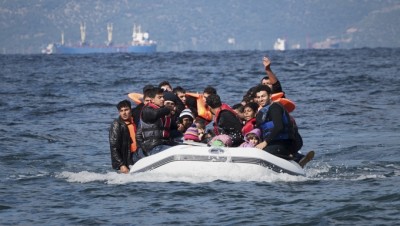The Causes of the Refugee Crisis: Mediterranean Refugee Death Toll in 2016 “Worst We Have Seen”
Introductory Note by Michel Chossudovsky

Introduction
The refugee crisis is triggered by US-NATO led wars (Iraq, Afghanistan, Syria, Yemen, Libya… ) “regime change”, “civil wars” and extreme poverty.
Poverty and despair are the result of the imposition of neoliberal economic reforms which have led to the demise of local industry and agriculture, the collapse of social services and state institutions.
The “civil wars” in the Sudan, Ethiopia, Somalia, Rwanda, the Democratic Republic of the Congo, among others are not “civil wars”. They are the result of armed insurrections financed ands supported by foreign powers, which have resulted in the destruction of entire countries.
These so-called “civil wars” are an integral part of a US foreign policy agenda which consists in “militarizing” the African continent (under the helm of US Africa Command, AFRICOM).
Neoliberalism and Militarization go hand in hand: “Strong economic medicine” under the helm of the IMF and the World Bank has contributed since the early 1980s to destabilizing national governments and public institutions, while undermining Africa’s fundamental economic and social structures, transforming countries into “open territories”.
“Poverty is good for business”: The peasant economy and local manufacturing have been destroyed. An entire continent has been opened up to a process of economic pillage (and environmental destruction) by the West’s energy, mining and agribusiness conglomerates.
War and Globalization: The refugee crisis is triggered by the despair of millions of people fleeing their homeland, whose lives have been destroyed as a result of US led wars and civil wars coupled with devastating macro-economic reforms imposed by “The Washington Consensus”.
Michel Chossudovsky, Global Research Editor, October 28, 2016
* * *
With just two months left in 2016, and despite a substantial drop in the number of migrants and refugees attempting to cross the Mediterranean, the number of people losing their lives has witnessed a three-fold overall increase this year, and in one particular route by more than five-fold, the United Nations refugee agency said today.
“From one death for every 269 arrivals last year, in 2016 the likelihood of dying has spiralled to one in 88,” William Spindler, a spokesperson for the Office of the UN High Commissioner for Refugees (UNHCR), told journalists at the regular news briefing at the UN Office at Geneva (UNOG).
“On the Central Mediterranean route between Libya and Italy the likelihood of dying is even higher, at one death for every 47 arrivals,” he added.
The grim ratio for this route has worsened by more than 5.7-times.
“This is the worst we have seen,” expressed the UNHCR spokesperson.
According to the agency, at least 3,740 lives are reported lost between January and October 2016 – just short of the 3,771 deaths reported for the whole of 2015. This high loss of life comes despite a large overall fall this year in the number of people seeking to cross the Mediterranean to Europe.
Last year at least 1,015,078 people made the crossing. This year so far, crossings stand at 327,800.
“About half those who have crossed the Mediterranean so far this year have travelled from North Africa to Italy – a known more perilous route,” said Mr. Spindler explaining one of the causes behind the rise.
He further said that other causes include people smugglers using lower-quality “vessels” – no more than flimsy inflatable rafts that often do not last the journey; and the changing tactics of smugglers, with mass embarkations of thousands of people at a time.
Such changes could be used to lower detecting risks but also make the work of rescuers much more difficult, according to UNHCR.
Against this bleak backdrop, the UN agency urged all countries to do more, calling for, among others, greater and urgent attention to means such as enhanced resettlement and humanitarian admissions, family reunification, private sponsorship, and humanitarian, student and work visas for refugees.
UNHCR official also underscored that the high death rate is a reminder of the importance of continuing and robust search and rescue capacities – without which the fatality rates would almost certainly be higher.



